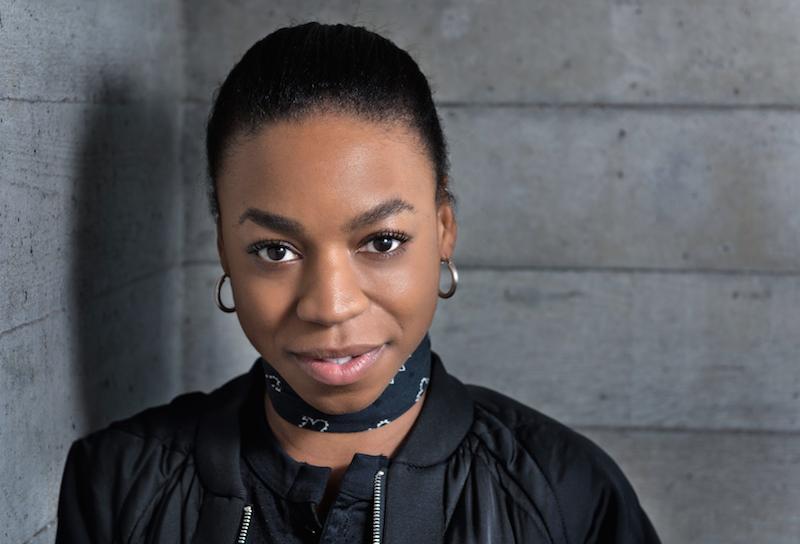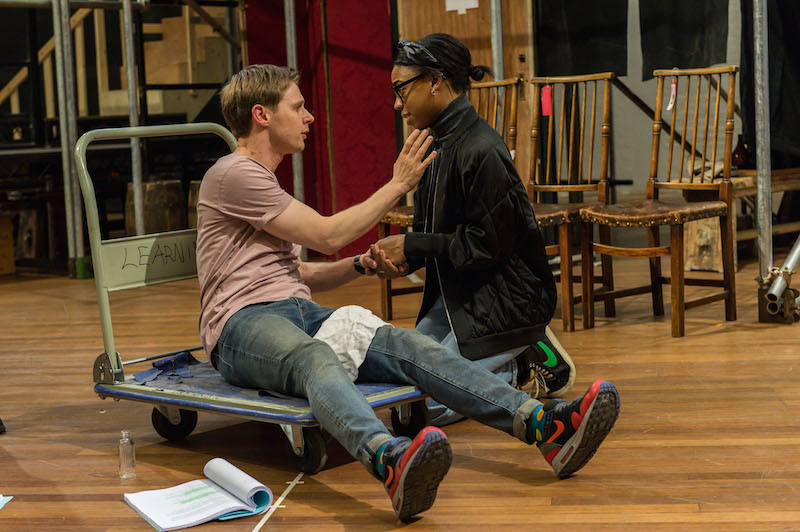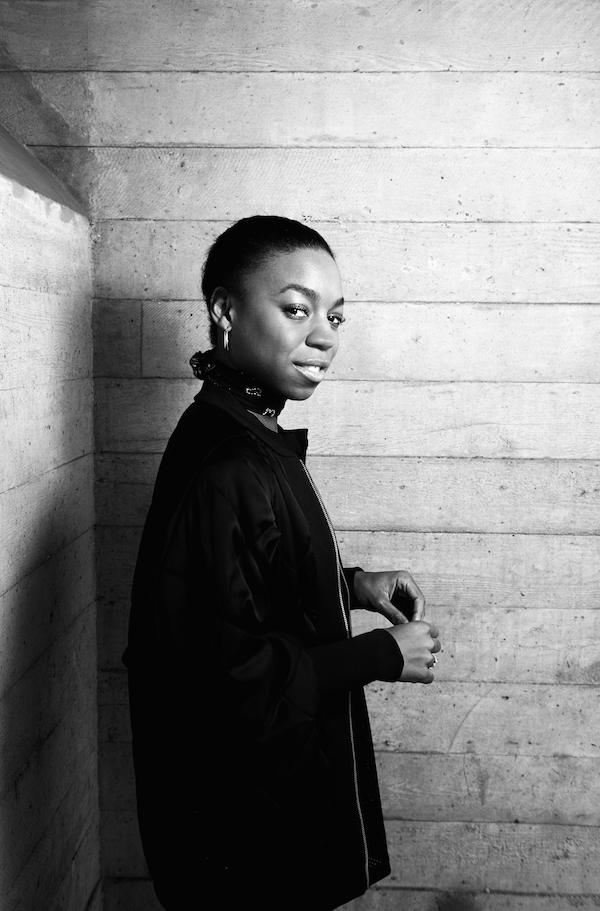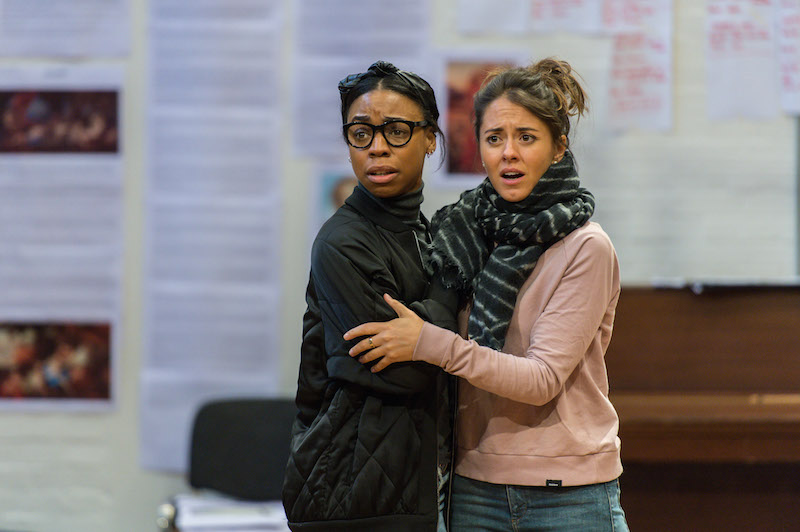10 Questions for Actress Pippa Bennett-Warner | reviews, news & interviews
10 Questions for Actress Pippa Bennett-Warner
10 Questions for Actress Pippa Bennett-Warner
The rising star talks comedy, corsets and colour-blind casting

At just 26, Pippa Bennett-Warner has already achieved many actors’ goals, from treading the boards at the National and having a part written specially for her to sharing scenes with luminaries like Derek Jacobi and Eddie Redmayne. She debuted aged 11 as one of the young Nalas in The Lion King, but since graduating from RADA, she has focussed on “straight acting”.
This week, she returns to the National after a three-year absence from the stage in Farquhar’s 18th century carnal comedy The Beaux’ Stratagem. Bennett-Warner (pictured below in rehearsal with Samuel Barnett, by Manuel Harlan) plays noblewoman Dorinda, who’s more than a match for the eponymous beaux hunting for a wealthy heiress to get them out of debt.
 MARIANKA SWAIN: Did you know much about the play beforehand?
MARIANKA SWAIN: Did you know much about the play beforehand?
PIPPA BENNETT-WARNER: I didn’t, not at all. When I read it, I thought: “Oh my God, this is so funny” – I think I LOL-ed on the tube! And it’s so current. Mrs Sullen, who teaches my character about men and the ways of the world, is this really strong, powerful feminist who questions everything. It’s wonderful to see a character written in that period who we can easily relate to now. That’s definitely important to me, and I think people will really get this.
We did lots of research into the era, but my major focus was Dorinda’s sexual awakening: at the beginning, she’s quite nerdy, quite geeky, and by the end of the play she’s a woman. I’ve gone back in my mind to the time when I first fell in love. Those “Boing!” moments of seeing someone and you just go: “Wow. That’s it.” And he’s your focus – everything goes to him. That happens for Dorinda with Samuel Barnett’s character Aimwell. I hope the audience thinks: “Oh yes, I remember the first time I felt like that.” People might feel these plays are impenetrable, but there’s definitely a way in.
Is the language challenging?
Oh my goodness, yes. Restoration reads so beautifully off the page, you think it’ll be OK, and then you put it on its feet and you think: “Yikes, can I actually speak this and move at the same time?” It’s just a gradual process of finally getting to a point where you’re comfortable. The beauty with Shakespeare is that you have the pentameter to help you out, so you can just jump on that verse and you’re good to go. With Restoration, you don’t have that. Every sentence, there’s another word in it that slightly changes the meaning of it, the way you’re going with what you’re saying – you have to be so on top of it. But when you get into the groove, you can hear it fly. It sings, like a beautiful melody.
In my second year at RADA I did ’Tis Pity She’s a Whore, so whenever I’ve felt overwhelmed, I’ve thought back to that – what did I do, what tools did we use to dig into the text. I actually deferred drama school for a year to do Caroline, or Change, and I wasn’t sure if I should go back, but my parents said training would be worth it, and they’re so right. It makes something like Beaux’ Stratagem feel like a real challenge, but a healthy challenge. Above all, it’s supposed to be fun and enjoyable. The more fun I have with it, the easier it’ll become. It’s the lightness of it that will make it thrive.
Comedy’s deceptively tough, though. Timing, placement… Just the logistics of putting on something like this. It’s a full-on, proper show: 121 pages, and it’s very dense in some parts, plus all the dancing and costumes. I had my fitting last week, and it’s corset, petticoats, these dainty shoes, a wig… I haven’t worn a corset before, and it changes everything – you can’t just bend down to pick something up. You’re literally restricted, as a woman. So it really helps you get into that mindset.
I did find I was starting to play the same 'urban' role, which is why I was desperate to come back to the stage
What’s it like playing the Olivier?
Definitely surreal! I’ve seen amazing people perform here, like Anne-Marie Duff in Saint Joan. We did a voice session the other day, and I realised it’s one of those places that looks way bigger from the auditorium than from the stage. From the stage, you think: “Yeah, I might be OK in here”, and then you go sit up in the auditorium and it’s the hugest space ever. Terrifying. But I’m going to make the Olivier my friend! I love this building – being somewhere where there’s loads of different things going on, all these amazing actors, writers, directors. Plus you’re on the South Bank, right in the centre of the action. It’s the most exciting theatre in the world.
The classical repertoire doesn’t always serve actresses well. Do you have your eye on any male roles, like Maxine Peake taking on Hamlet?
That would be great fun. But you can find something interesting in lots of those supporting parts. Like when I played Queen Isabella [opposite Redmayne in Richard II], I really worked to give her a stronger voice and think about some of the back and forth in that relationship. Luckily, Farquhar has done us proud – he’s delivered some really lovely, complex female characters for us to sink our teeth into. They’re better than the female parts in lots of modern films and telly.
Is that what brought you back to the stage?
I hadn’t done a play for three years – that was a conscious choice. And I enjoy working in different media. But I’m all about character, and going on a real journey, starting somewhere and ending up in a completely different place. That’s so pleasurable, getting to go on that journey every night. You take it for granted, but it’s not the case in some dramas (Bennett-Warner pictured below by Bill Knight).
 Do you think actresses, particularly actresses of colour, are still limited by the parts on offer?
Do you think actresses, particularly actresses of colour, are still limited by the parts on offer?
There are some brilliant roles if you wait for them. I’m not afraid of not working, so I take my time deciding what I want to do next. I’m pretty Zen: if it’s meant to happen, it’ll happen. Telly wise, I did find I was starting to play the same “urban” role, which is why I was desperate to come back to the stage. Here, there’s a chance to be whoever you want to be. A three-dimensional, 18th century woman, whose family happens to be played by white actors, falling in love: I wouldn’t get the chance to do that on telly.
On stage, you just get more freedom; screen is way behind in that sense. I’d love see more colour-blind casting across the board. I try not to play stereotypical black roles – one of the most fantastic things is when you get a character description and the first word isn’t “black”. Being here in London, we’re such a diverse city. It would be euphoric to see the diversity that we as Londoners encounter every day on the stage and screen. I’m not sure it’s going to happen in the next five years, or the next 10 years, but let’s see…
How do we tackle the problem? Is it about setting targets?
I think it’s more changing our mentality. And less talking, more doing! They’re pioneering it in the States, which is so exciting. Here, we’re slightly more…gently does it. It’s a bit of an uphill struggle. But we’ll get there! I’d love to see more people like me represented. People speak to me on the phone, and because of my name and because I sound “posh”, they expect a blonde wearing pearls. I don’t sound the way they think black people sound, which is crazy. I’m black, and I was educated a certain way, and that’s that. The posh black thing is very interesting to me. I don’t see myself in any particular way. I don’t pigeonhole myself, I’m just me. People like putting everyone in boxes still. But each generation, it’s beginning to change, and drama can definitely play a positive role in that.
I’m lucky enough to have an agent who’s able to see outside the box, so I’ve gone up for parts people might not expect. You should definitely go after jobs, even if someone hasn’t envisioned that casting. You have to take the restriction off yourself – you’re not just a black actress, you’re an actress doing a job like everyone else. If the restrictions come off at home, your scope will widen. You can think bigger. It starts with you.
What are your ambitions for the future? Would you like to do more new writing?
Absolutely. The Witness was an amazing experience, and so was The Swan. I love new writing. Especially when you’re fortunate enough to have the writer in the room – they’re your resource. It’s harder to check in with Farquhar. But we do have the wonderful Patrick Marber, who’s working on the play with us – you can just feed off his knowledge. He’s been really helpful with the comic timing and the context of the jokes. Plus he wears very cool trainers! That’s important in my book (Bennett-Warner pictured below by Manuel Harlan, with Susannah Fielding in rehearsal for The Beaux' Stratagem).
 Do you have any dream roles?
Do you have any dream roles?
There’s one I’d really love to play. I did it at RADA, and I’m way too young still, but fuck it. Liz Essendine in Present Laughter – it’s a phenomenal play, and I fell in love with Liz. But really any good character with something meaningful to do. You read stuff where women are just part of the furniture, or overly emotional, or they’re all about offering support to someone else’s journey rather than going on one of their own.
What advice would you give to young actresses who feel pressured to take the silly-girlfriend roles?
Well, some of the silly-girlfriend roles are great fun. It depends on where you are and what you want for yourself, for your career – everybody’s chasing something different. If it’s the right choice for you at that time, go for it. If you’re averse to doing so, then sit it out – wait for your strong woman to come along, because she probably will. Take your time. It’s a marathon, not a sprint. And it’s really important to stay true to who you are. I’m very attracted to strong female parts, strong people. All my girlfriends are independently minded women. I like being around women who have a voice.
I definitely think about that when I’m choosing roles. The Beaux’ Stratagem is such a pleasure, because it’s this rich period piece, but these are 21st century women in the way they shape their own world and the way they talk – they’re intelligent and witty, and they have, or gain, self-respect. Susie’s [Susannah Fielding] character, Mrs Sullen, has this great line: “Dorinda, if my Lord Aimwell loves you, or deserves you, he’ll find a way to see you.” That’s so modern. Farquhar really knows what he’s talking about! I think people who come to see the play will be pleasantly surprised at how insightful it is. There’s great advice passed down through the centuries.
Explore topics
Share this article
The future of Arts Journalism
You can stop theartsdesk.com closing!
We urgently need financing to survive. Our fundraising drive has thus far raised £49,000 but we need to reach £100,000 or we will be forced to close. Please contribute here: https://gofund.me/c3f6033d
And if you can forward this information to anyone who might assist, we’d be grateful.

Subscribe to theartsdesk.com
Thank you for continuing to read our work on theartsdesk.com. For unlimited access to every article in its entirety, including our archive of more than 15,000 pieces, we're asking for £5 per month or £40 per year. We feel it's a very good deal, and hope you do too.
To take a subscription now simply click here.
And if you're looking for that extra gift for a friend or family member, why not treat them to a theartsdesk.com gift subscription?
more Theatre
 Mary Page Marlowe, Old Vic review - a starry portrait of a splintered life
Tracy Letts's Off Broadway play makes a shimmeringly powerful London debut
Mary Page Marlowe, Old Vic review - a starry portrait of a splintered life
Tracy Letts's Off Broadway play makes a shimmeringly powerful London debut
 Little Brother, Soho Theatre review - light, bright but emotionally true
This Verity Bargate Award-winning dramedy is entertaining as well as thought provoking
Little Brother, Soho Theatre review - light, bright but emotionally true
This Verity Bargate Award-winning dramedy is entertaining as well as thought provoking
 The Unbelievers, Royal Court Theatre - grimly compelling, powerfully performed
Nick Payne's new play is amongst his best
The Unbelievers, Royal Court Theatre - grimly compelling, powerfully performed
Nick Payne's new play is amongst his best
 The Maids, Donmar Warehouse review - vibrant cast lost in a spectacular-looking fever dream
Kip Williams revises Genet, with little gained in the update except eye-popping visuals
The Maids, Donmar Warehouse review - vibrant cast lost in a spectacular-looking fever dream
Kip Williams revises Genet, with little gained in the update except eye-popping visuals
 Ragdoll, Jermyn Street Theatre review - compelling and emotionally truthful
Katherine Moar returns with a Patty Hearst-inspired follow up to her debut hit 'Farm Hall'
Ragdoll, Jermyn Street Theatre review - compelling and emotionally truthful
Katherine Moar returns with a Patty Hearst-inspired follow up to her debut hit 'Farm Hall'
 Troilus and Cressida, Globe Theatre review - a 'problem play' with added problems
Raucous and carnivalesque, but also ugly and incomprehensible
Troilus and Cressida, Globe Theatre review - a 'problem play' with added problems
Raucous and carnivalesque, but also ugly and incomprehensible
 Clarkston, Trafalgar Theatre review - two lads on a road to nowhere
Netflix star, Joe Locke, is the selling point of a production that needs one
Clarkston, Trafalgar Theatre review - two lads on a road to nowhere
Netflix star, Joe Locke, is the selling point of a production that needs one
 Ghost Stories, Peacock Theatre review - spirited staging but short on scares
Impressive spectacle saves an ageing show in an unsuitable venue
Ghost Stories, Peacock Theatre review - spirited staging but short on scares
Impressive spectacle saves an ageing show in an unsuitable venue
 Hamlet, National Theatre review - turning tragedy to comedy is no joke
Hiran Abeyeskera’s childlike prince falls flat in a mixed production
Hamlet, National Theatre review - turning tragedy to comedy is no joke
Hiran Abeyeskera’s childlike prince falls flat in a mixed production
 Rohtko, Barbican review - postmodern meditation on fake and authentic art is less than the sum of its parts
Łukasz Twarkowski's production dazzles without illuminating
Rohtko, Barbican review - postmodern meditation on fake and authentic art is less than the sum of its parts
Łukasz Twarkowski's production dazzles without illuminating
 Lee, Park Theatre review - Lee Krasner looks back on her life as an artist
Informative and interesting, the play's format limits its potential
Lee, Park Theatre review - Lee Krasner looks back on her life as an artist
Informative and interesting, the play's format limits its potential
 Measure for Measure, RSC, Stratford review - 'problem play' has no problem with relevance
Shakespeare, in this adaptation, is at his most perceptive
Measure for Measure, RSC, Stratford review - 'problem play' has no problem with relevance
Shakespeare, in this adaptation, is at his most perceptive

Add comment